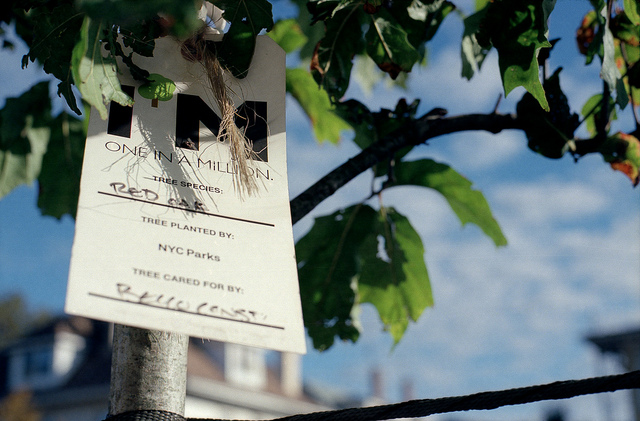
How do civic gateways work for everyone?
Photo by Flickr user David Tan.
Dana R. Fisher is professor of sociology and director of the Program for Society and the Environment at the University of Maryland. Her essay builds on findings from a study funded by the National Science Foundation and the U.S. Forest Service. She considers the research and its impact on civic engagement for Knight News Challenge: Elections, which asks the question: How might we better inform voters and increase civic participation before, during and after elections? The best nonpartisan ideas will share in more than $3 million. Apply at newschallenge.org. RELATED LINKS
“Informing and generating interest in elections and voting” by David Nickerson on Knight Blog
“Why we care about elections” by John Bracken on Knight Blog, 03/10/15
“Taking civic participation from the voting booth to the streets” by Seamus Kraft on Knight blog, 03/09/15
“Knight News Challenge: Elections Mixtape” by Knight Foundation
“Towards empathetic disruption: Civic tech and doing what works” by John Bracken and Lucas Hernandez on Knight blog, 03/04/15
“Democracy Works launches new voter tool, expands programs” by Seth Flaxman on Knight blog, 03/04/15
“Better informing voters and increasing civic participation focus of new $1.4 million support to Democracy Works from Knight Foundation and MacArthur Foundation” – press release, 3/4/15
“Balancing technology risks and benefits in elections” by Jeremy Epstein on Knight blog, 03/02/15
“To improve civic participation we need transparency” by Chris Gates on Knight blog, 02/26/15
“Civic engagement essential to strengthening democracy” by Kelly Born on Knight blog, 02/25/15
“Knight News Challenge on Elections offers more than $3 million for innovative ideas” – press release, 02/25/15
“Knight News Challenge on Elections opens for ideas” by Chris Barr and Shazna Nessa on Knight blog, 02/25/15
“Knight News Challenge to focus on Elections” on Knight blog, 02/12/15
As much of the country begins to defrost from a harsh winter, individuals and communities are just beginning to dig in to spring planting season. In communities around the United States, individual volunteers are participating in efforts to plant trees and remove weeds from public and private lands. These efforts are known to have environmental, as well as broader social benefits for communities. One of the lesser-discussed benefits of such greening initiatives, however, is the effect that digging together as a community can have on the civic lives of the individuals who participate, and affect other behaviors such as voting.
My work has found that actively participating in these kinds of environmental activities—such as planting trees, taking care of a watershed or volunteering at an urban farm—serves as a kind of civic gateway for Americans to get more involved in their communities. In our new book, “Urban Environmental Stewardship and Civic Engagement: How Planting Trees Strengthens the Roots of Democracy,” my co-authors and I unpack this relationship, presenting findings from a two-year study of more than 700 volunteer stewards involved in the MillionTreesNYC initiative. In 2015, this initiative will plant its millionth tree and fulfill the goals set forth by the public-private partnership between Mayor Michael Bloomberg’s administration and the New York Restoration Project. Beyond making the city greener and more resilient to floods from storm events such as Hurricane Sandy, we find that the initiative has also provided a civic gateway for New Yorkers to get more involved environmentally, as well as to become more engaged citizens overall. In the book, we not only look at the civic engagement of volunteer stewards on the day that they help plant trees, we also follow up with them a year later and find that planting trees played a role in encouraging them to be more active citizens.
Although our work points to the ways that environmental activities channel participants into more civic lifestyles, we have yet to understand how these mechanisms work across race and class. Even though my research studies citizens participating in environmental activities in communities that are home to diverse populations, environmental participants tend to be exactly who you would expect: They are whiter, more highly educated, and more female than the general population and the communities in which they are stewarding.
Given the significant effects digging in the dirt can have on civic participation, we need to understand the degree to which these findings are consistent across race and class. Will planting trees and digging in gardens have the same effect for everyone? Are the channels that have been found to mobilize communities of color to participate in civic activities the same ones that get them out to dig in the dirt or clean up their neighborhood parks? To understand fully environmental stewardship as a civic gateway, we need to turn our attention to understanding variations across race and class. The Knight News Challenge presents an opportunity to explore the ways that city and community efforts to plant trees, protect watersheds and green communities can serve as an onramp for broader civic participation for everyone. The environmental effects of these efforts is already well known, but it is time to devote attention to the ways they also contribute to the strength and vitality of democracy before, during and after elections.
Dana R. Fisher is the author (with Erika Svendsen and James Connolly) of “Urban Environmental Stewardship and Civic Engagement: How Planting Trees Strengthens the Roots of Democracy” (Routledge Press, 2015).
Knight Foundation is partnering with the Democracy Fund, the William and Flora Hewlett Foundation and the Rita Allen Foundation on Knight News Challenge: Elections, which asks the question, How might we better inform voters and increase civic participation before, during and after elections? The best nonpartisan ideas will share in more than $3 million. Apply at newschallenge.org by 5 p.m. ET March 19. Winners will be announced in June.
Recent Content
-
Journalismarticle ·
-
Journalismarticle ·
-
Journalismarticle ·


